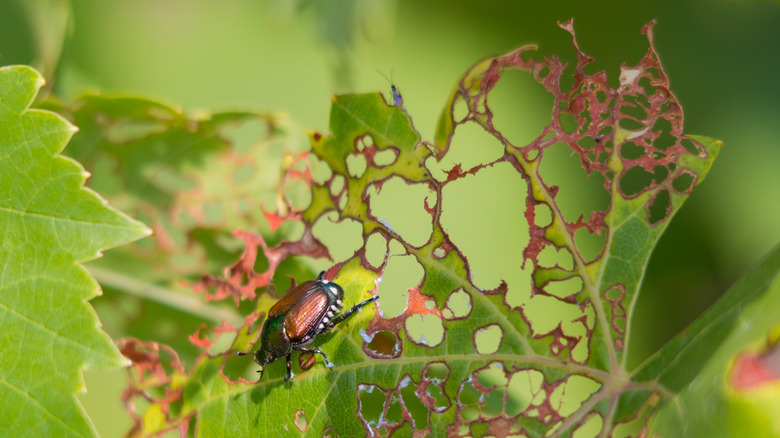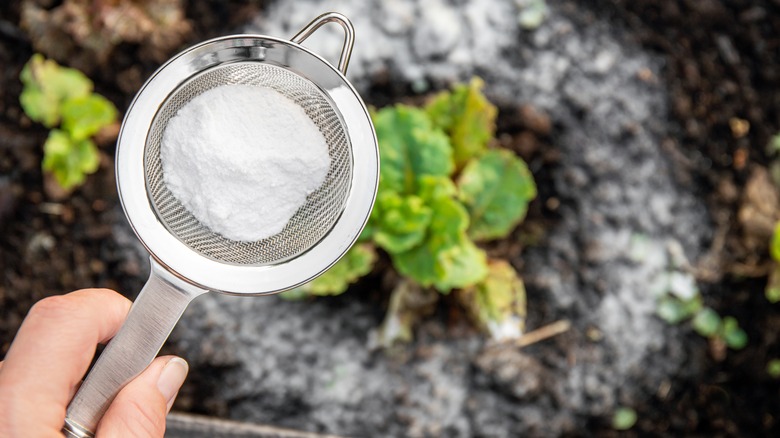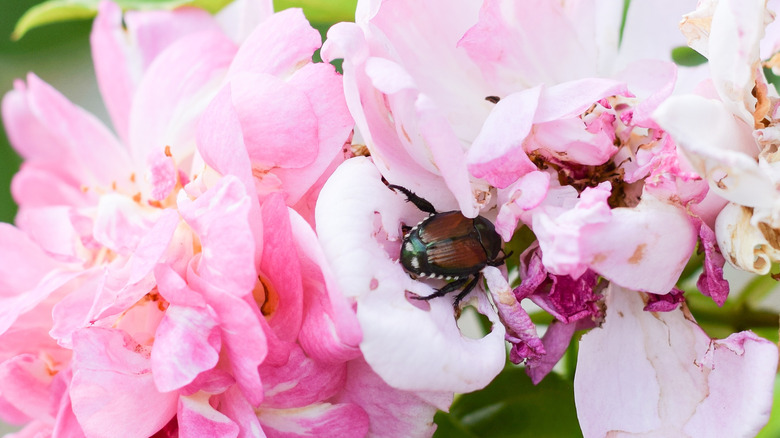Our Pest Control Expert Tells Us If Diatomaceous Earth Is A Natural Way To Get Rid Of Japanese Beetles
Japanese beetles are your plants' enemy. Whether it's your front lawn, window flowers, or vegetable garden, these pests attack roots and foliage, leaving you with a brown plant riddled with holes. Diatomaceous earth is often used as a bug control method to banish the worst garden pests from your yard, but will it work against these critters? In an exclusive interview with House Digest, Matt Rogers, CEO and Co-Founder of Pestie, confirmed it will.
"Japanese beetles can often be a tricky pest to get rid of. While most advice would tell you to hand pick the beetles off your plants, that is a tedious chore that isn't always 100% effective," Rogers said. "However, diatomaceous earth can be an alternative, organic solution for controlling Japanese beetles." This convenient method will leave your yard beetle-free. Rogers shared how to use diatomaceous earth and what to keep in mind when spreading the powder in your outdoor space.
Diatomaceous earth is a solution to eliminate Japanese beetles
"Diatomaceous earth is made up of microscopic [silica-based] fossils that act like shards of glass," Matt Rogers exclusively told House Digest. "When an insect brushes against them, it cuts into the waxy layer of their exoskeleton, causing them to lose water and become dehydrated." The sharp minerals will dry out and kill the invading Japanese beetles feasting on your garden. Plus, it's non-toxic and easy to apply.
Simply dust diatomaceous earth on the soil and foliage of the affected plant to kill any lurking beetles. Misting the leaves with water before sprinkling the crushed mineral can help it to stick to the greenery better. Rogers advised, "A dust applicator is usually superior to hand-applying the powder, as too much powder can make the product ineffective." You can sift the bug-killing grounds through a sieve or repurpose an old spice jar to finely apply it where needed.
"Additionally, heavy downpours or strong thunderstorms can wash away the powder, and you'll need to reapply it to your plants," the pest control expert said. If it's only a minor rainfall, the solution should be fine and will regain its effectiveness after it dries. Diatomaceous earth is safe for you, your plants, and your pets, but there are a few precautions to keep in mind.
Precautions when using diatomaceous earth
There are two major things to watch out for when using diatomaceous earth: The harm it can cause to your respiratory system and to pollinators. Although the mineral is non-toxic, Matt Rogers exclusively told House Digest, "Just make sure not to inhale the powder when you are applying it." The fine particles can enter your lungs, causing irritation, inflammation, and scarring. To be safe, wear a mask when dusting the powder and wash your hands after handling it.
The bug-dehydrating power of diatomaceous earth works against Japanese beetles but also other critters caught in the crossfire. Rogers explained, "The powder will kill any insects that come in contact with it, so if your plant attracts pollinators, you can't guarantee they will be safe around it." We need insects like butterflies and bees, so it may be best to opt for an alternative pest control method if Japanese beetles are attacking your pollinator-attracting plants.
Rogers shared, "Other options for organic Japanese beetle control include neem oil and milky spore products. You can apply the milky spore product on the soil and the milky spore turns into a fungus that attacks the Japanese beetle white grubs in the soil before they emerge." Another option is to use neem oil in your garden, much like a standard pesticide spray, to eliminate the eggs, larvae, and adult beetles. Both alternatives are natural, like diatomaceous earth, but won't harm other beneficial insects.



